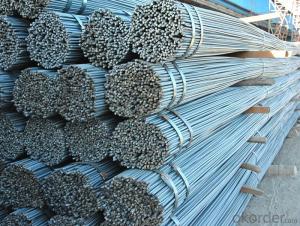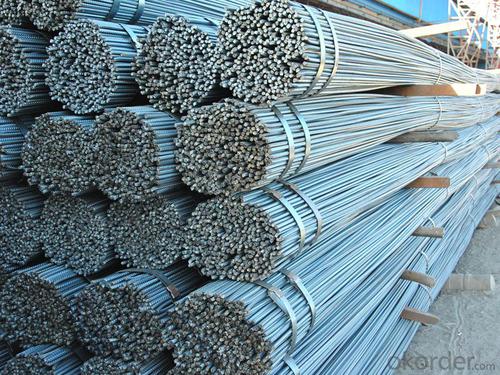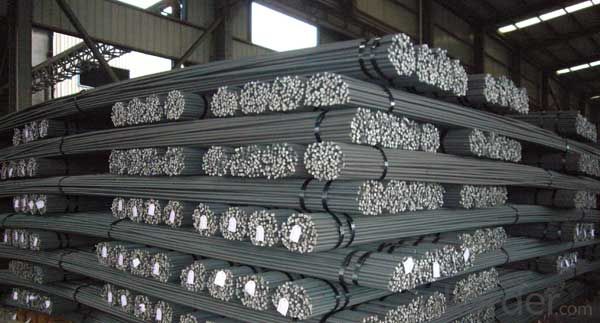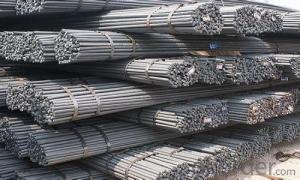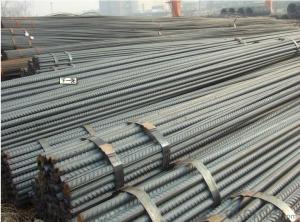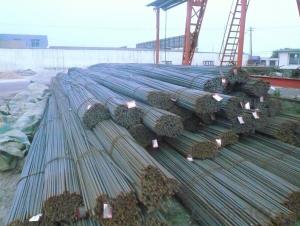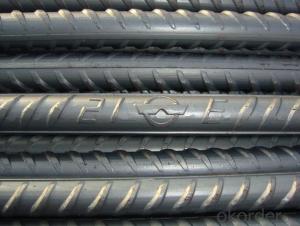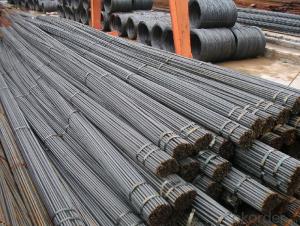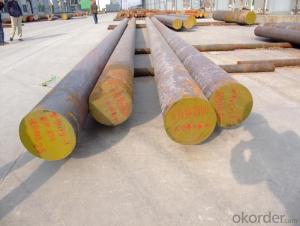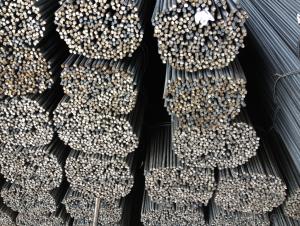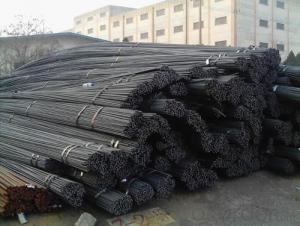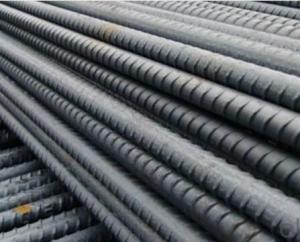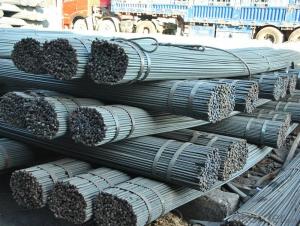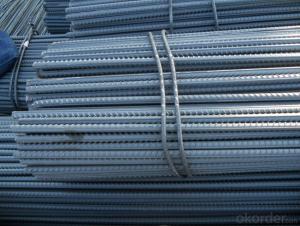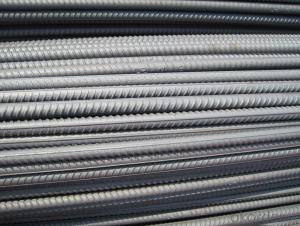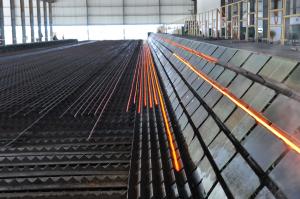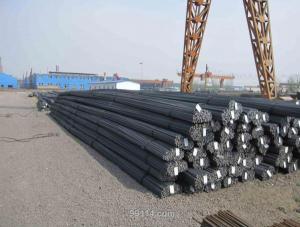Steel Rebar, Deformed Steel Bar,Iron Rods For Construction/Concrete/Building
- Loading Port:
- Shanghai
- Payment Terms:
- TT OR LC
- Min Order Qty:
- 100 m.t.
- Supply Capability:
- 1000 m.t./month
OKorder Service Pledge
OKorder Financial Service
You Might Also Like
deformed steel bar grade 40
material: HRB400, BS4449 GR460B
size: 8-36mmx12m.
short delivery time by bulk or container
deformed steel bar grade 40
material: HRB400, BS4449 GR460B
size: 8-36mmx12m.
short delivery time with bulk or container
packing: Mill standard export packing in bundles/coil, around 2tons/bundle.
country of Origin: China
delivery Time: Within a 35 days
Shipment: by bulk vessel or by container
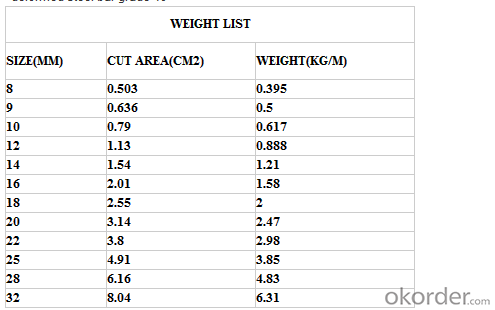
Leading goods:
section steel:angles,channels,I-beam,H-beam;
coils:cold/hot rolled coils,PPGI,galvanized coils,plate,checkered plate,cutting steel plate,steel strip;
wire rod:steel wire,deformed wire,bar;
pipe:seamless pipe,rectangular pipe,welded pipe,spiral welded pipe,pipe fittings;
stainless steel:steel sheets,stainless steel strips,stainless bar,stainless tube;
special:weathering steel,shipbuilding steel;
construction steel:C-channel,Z-channel,T-bar,high-speed divider plate,corrugated steel plate,steel grating.
Advantage:
We are the spot supplier, Six huge warehouses which can hold 20,000 MT goods.It makes the cost lower than others,we can provide the competitive price for you.
Delivery time:
Normal sizes can be provided in 7days, the others should be ready in 30---45 days.
Further treatment:
We can offer cutting,painting,drilling holes,bending,threading, welding,galvanization,packing etc.
Security interest:
We have already passed the ISO9001, BV and SGS authentication which makes the quality secured.
If you have the interest in any of the products we can provided, pls don't hesitate to connect with me. Looking forward to cooperate with you.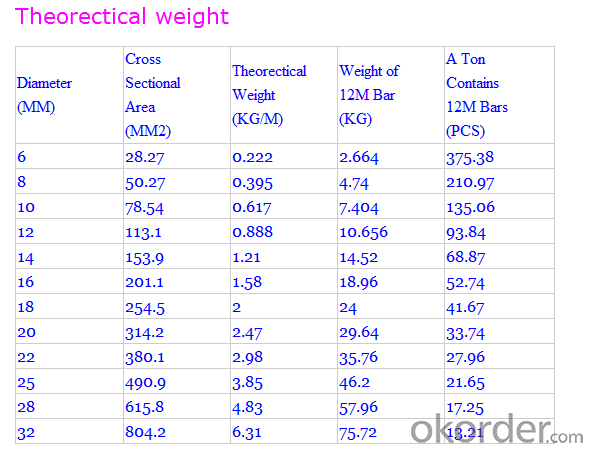
FAQ of Steel Deformed Bar
1. More than 10 years experience in this industry
2. 100,000 tons exporting per month
3. Professional foreign trade tea
4. OEM&ODM capacity
5. High quality assured & competitive price
6. Try our best to meet your needs & save your budget
7. Very popular in Southeast Asia, Africa, Mid-East and South America etc.
8. VIP membership system, first time customers and long-term cooperation customers can get extra discount on some products.
- Q: How do steel rebars affect the load-bearing capacity of concrete structures?
- Concrete structures greatly benefit from the use of steel rebars, as they play a crucial role in improving their load-bearing capacity. These rebars are embedded within the concrete to provide tensile strength, as concrete is known to be weak in tension. By reinforcing the concrete, rebars effectively distribute and bear the applied loads, ultimately enhancing the overall structural performance. The incorporation of steel rebars in concrete structures serves to resist cracking and prevent structural failure under various load conditions. When a load is exerted on a concrete structure, such as a beam or column, the rebars absorb the tensile forces generated by the load. This action safeguards the concrete from cracking and ensures the structure remains intact and stable. Furthermore, the utilization of rebars also enhances the flexural strength of concrete structures. Flexural strength refers to the capacity of a material to withstand bending forces. Through the reinforcement of concrete with rebars, the structure becomes more resistant to bending and can support heavier loads without experiencing excessive deflection or failure. Additionally, steel rebars play a pivotal role in enhancing the shear strength of concrete structures. Shear strength refers to the ability of a material to resist forces that cause one layer of the material to slide relative to another. By providing additional reinforcement, rebars strengthen the concrete against shear forces, thereby increasing the structure's resistance to lateral loads and preventing shear failure. In summary, steel rebars significantly bolster the load-bearing capacity of concrete structures by providing tensile, flexural, and shear strength. Their presence enables concrete structures to withstand higher loads, enhances their durability, and ensures their long-term structural integrity. Proper design and installation of rebars are imperative when constructing safe and structurally sound concrete buildings, bridges, and other infrastructure projects.
- Q: How do steel rebars affect the overall construction schedule?
- Steel rebars can have a significant impact on the overall construction schedule. They are crucial components in reinforced concrete structures, providing strength and stability. However, delays in the delivery or installation of rebars can lead to project setbacks. Inadequate supply or improper placement can cause construction delays, affecting the timeline of subsequent activities such as concrete pouring and curing. Therefore, ensuring timely procurement and accurate installation of steel rebars is essential for maintaining an efficient construction schedule.
- Q: How do steel rebars contribute to the overall fire resistance of a structure?
- Enhancing the fire resistance of a structure, steel rebars, also known as reinforcing bars, play a vital role. They contribute to the overall fire resistance in various ways. Primarily, steel rebars are made from a material renowned for its high melting point and exceptional heat resistance. As a result, even in the event of a fire, the rebars maintain their structural integrity and do not easily deform or collapse. This is especially crucial for tall buildings where temperatures can reach extreme levels during a fire. Furthermore, the presence of steel rebars aids in the even distribution of heat throughout the structure. When exposed to high temperatures, steel absorbs and conducts heat away from the fire source, preventing concentrated hotspots and reducing the risk of structural failure. This redistribution of heat helps maintain the stability and integrity of the building, allowing occupants valuable time to safely evacuate. Moreover, steel rebars are commonly embedded within concrete, forming a composite material called reinforced concrete. The combination of steel and concrete creates a synergistic effect in terms of fire resistance. While steel possesses high tensile strength, concrete exhibits excellent compressive strength. When exposed to fire, the concrete acts as a protective layer, slowing down the transfer of heat to the steel rebars. This delay in heat transfer enables the steel to retain its strength for a longer period, further enhancing the fire resistance of the structure. Additionally, steel rebars aid in preventing the spread of fire by creating compartments within the building. In the event of a fire, the reinforced concrete structure acts as a barrier, limiting the fire's ability to spread from one area to another. This containment of fire reduces potential damage and facilitates the effective control and extinguishing of the fire by emergency responders. In conclusion, steel rebars make a significant contribution to the overall fire resistance of a structure. Their high melting point, ability to redistribute heat, and combination with concrete create a dependable and durable fire-resistant system. By providing structural stability, preventing concentrated hotspots, and limiting the spread of fire, steel rebars play a critical role in ensuring the safety and protection of both the building and its occupants during a fire incident.
- Q: Can steel rebars be used in high-strength concrete?
- Yes, steel rebars can be used in high-strength concrete. In fact, they are commonly used as reinforcement in high-strength concrete structures to enhance the overall strength and durability of the concrete.
- Q: Can steel rebars be used in the construction of office buildings?
- Yes, steel rebars can be used in the construction of office buildings. Steel rebars are commonly used as reinforcement in concrete structures, including office buildings, to provide strength and stability. They are crucial in reinforcing the concrete and enhancing the building's overall structural integrity.
- Q: What are the advantages of using galvanized steel rebars?
- Using galvanized steel rebars in construction projects offers several advantages. Firstly, the rebars are protected by a zinc coating that prevents corrosion, ensuring their durability and longevity. Unlike traditional steel rebars that may rust, the zinc coating acts as a barrier against moisture and other corrosive elements, preserving the structure's integrity. Secondly, galvanized steel rebars have a high ratio of strength to weight. This means they are both lightweight and incredibly strong, making them ideal for reinforced concrete structures. Their strength allows for the use of thinner and lighter rebars, reducing the overall weight of the structure and increasing cost-effectiveness. Additionally, working with and installing galvanized steel rebars is easy. They can be cut, bent, and shaped to meet specific project requirements. This ease of handling enables faster construction, saving both time and money. Furthermore, galvanized steel rebars are fire-resistant. The zinc coating acts as a protective layer, preventing them from burning or sustaining damage from high temperatures. This fire resistance is crucial for ensuring the stability and safety of structures, particularly in fire-prone areas or where fire safety regulations are strict. Lastly, galvanized steel rebars are environmentally friendly. The zinc coating used in the galvanization process is non-toxic and recyclable. This means that at the end of their lifespan, galvanized steel rebars can be easily recycled and reused, minimizing waste and reducing their environmental impact. In conclusion, the advantages of galvanized steel rebars include corrosion resistance, a high strength-to-weight ratio, ease of installation, fire resistance, and environmental friendliness. These benefits make them a popular and trustworthy choice for reinforcing concrete structures in various construction projects.
- Q: Are steel rebars magnetic?
- Yes, steel rebars are magnetic as they are typically made from carbon steel, which is a ferromagnetic material.
- Q: What are the main uses of steel rebars?
- Steel rebars, also known as reinforcing bars, are primarily used in construction and civil engineering projects to provide strength and stability to concrete structures. The main uses of steel rebars include: 1. Reinforcing Concrete: Steel rebars are embedded within concrete structures to enhance their tensile strength. Concrete is excellent at withstanding compressive forces, but it is weak in tension. By adding rebars, the composite material formed (reinforced concrete) can resist both compressive and tensile forces, making it suitable for various applications such as building columns, beams, slabs, and foundations. 2. Structural Stability: Steel rebars play a crucial role in enhancing the structural stability of buildings and infrastructure. They help distribute the load evenly across the structure, preventing cracks, sagging, or collapse. By reinforcing concrete elements with rebars, structures can withstand heavy loads, seismic activity, and other external forces. 3. Bridges and Highways: Steel rebars are extensively used in the construction of bridges and highways. Bridges, being subjected to significant loads and harsh environmental conditions, require strong and durable reinforcement. Steel rebars ensure the longevity and structural integrity of these critical infrastructure projects. 4. Retaining Walls and Tunnels: Retaining walls are designed to hold back soil or other materials and prevent erosion. Steel rebars are commonly used to reinforce these structures, enabling them to withstand the lateral pressures exerted by the retained material. Similarly, in tunnel construction, rebars provide strength to the concrete lining, ensuring stability and preventing collapse. 5. Foundations: Steel rebars are a vital component in the construction of building foundations. They help distribute the weight of the structure evenly to the ground, preventing settlement or sinking. Moreover, rebars help anchor the foundation to the ground, providing stability against soil movement or seismic forces. 6. Pre-stressed and Post-tensioned Concrete: In pre-stressed and post-tensioned concrete construction, steel rebars are used to introduce compressive forces into the concrete members. This technique enhances the structural performance by reducing tensile stress, increasing load-bearing capacity, and minimizing cracking. 7. Masonry Reinforcement: Steel rebars are also utilized to reinforce masonry structures like walls, columns, and arches. By embedding rebars within the mortar joints or cores, the overall strength and stability of the masonry system are improved, allowing it to resist lateral loads and seismic forces. In summary, steel rebars are indispensable in modern construction, providing strength, stability, and durability to concrete structures. With their ability to resist tensile forces, they ensure the safety and longevity of buildings, bridges, highways, tunnels, and other essential infrastructure projects.
- Q: Can steel rebars be used in road construction projects?
- Yes, steel rebars can be used in road construction projects. They are commonly used as reinforcement in concrete structures, including roads and bridges, to enhance their strength and durability.
- Q: Can steel rebars be used in residential construction projects?
- Yes, steel rebars can be used in residential construction projects. They are commonly used to reinforce concrete structures such as foundations, walls, and columns in residential buildings to enhance their strength and durability.
Send your message to us
Steel Rebar, Deformed Steel Bar,Iron Rods For Construction/Concrete/Building
- Loading Port:
- Shanghai
- Payment Terms:
- TT OR LC
- Min Order Qty:
- 100 m.t.
- Supply Capability:
- 1000 m.t./month
OKorder Service Pledge
OKorder Financial Service
Similar products
Hot products
Hot Searches
Related keywords
